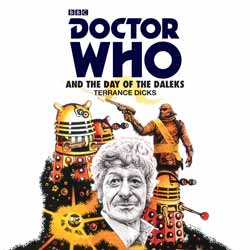|
Click here to return to the main site. Audio Book Review
Mysterious humans from 22nd-century Earth ‘time-jump’ back into the 20th century, to assassinate a high-ranking diplomat on whom the peace of the world depends. The Doctor, Jo Grant and the Brigadier are soon called in to investigate. Jo is accidentally transported to the future; the Doctor follows, eventually to be captured by his oldest and deadliest enemies: the Daleks! Having submitted the Doctor to the fearful Mind Analysis Machine, the Daleks plan a ‘time-jump’ attack on Earth in the 20th century! Can the Doctor and his friends prevent the course of history from being drastically altered…? This is an unabridged reading of Terrance Dicks’s 1974 novelisation of the four-part Doctor Who story Day of the Daleks. The original 1972 serial had been written by Louis Marks, though Dicks was instrumental in its development (including the addition of the Daleks to Marks’s time-travel plot), having been the programme’s script editor at the time. Perhaps because of this close association, and also because it was one of Dicks’s earliest novelisations (before he ended up churning out 120-page shorties on a monthly basis), Doctor Who and the Day of the Daleks is also one of his best. He adds new material to the first chapter, presenting the point of view of the rebel Moni (who had been called Monia on screen) and to the final one, restoring a scene with the Doctor and Jo that had been omitted from the televised serial. He also reveals the inner musings of characters such as the freedom fighters, the Controller of Earth Sector One, the Brigadier, Jo and the Doctor – including, memorably, the fact that the wine served to him by the Controller is nowhere near as palatable as the Time Lord diplomatically claims it is. Knowing that the listener will already be expecting the Daleks to turn up (they’re mentioned in the title, after all, and shown on the front cover), Dicks does not hold back from revealing their presence as the masters of 22nd-century Earth. The downside of these early depictions of the future dystopia, its dictators and its resistance members, is that there is never any real sense that Austerly House (which on television had been called Auderly House) may be haunted and that the diplomat Sir Reginald Styles might actually have seen a ghost, despite a chapter title to that effect. On the upside, though, the novelist makes the Daleks a more potent force than the mere three props that were seen on screen. This audio book is read by Richard Franklin, who played Captain Mike Yates. As usual, Franklin does rather insulting impersonations of Jon Pertwee’s Doctor and John Levene’s Sergeant Benton, exaggerating the former’s lisp and making the latter sound like a country bumpkin. He gives the Controller a Germanic accent. His Yates, of course, is spot on! Meanwhile, the Dalek voices, which are provided by Nicholas Briggs, are a great improvement on the weak monotones that were heard in the original production. Hearing this work in sound only, there is some confusion between the homophones “guerrilla” and “gorilla”, as Dicks often describes the freedom fighters as guerrillas, while their enemies, the ape-like Ogrons, are likened to gorillas. There’s no need to go ape about that, however, because this is otherwise a very strong presentation of an excellent novelisation. 9 Richard McGinlay Buy this item online
|
|---|

